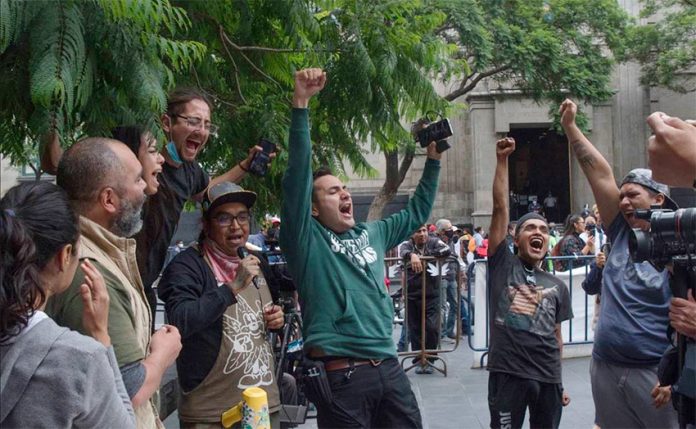The Supreme Court (SCJN) on Monday struck down laws banning the use of recreational marijuana, declaring once again that its prohibition is unconstitutional.
The court ruled 8-3 that sections of the General Health Law that prohibit personal use of marijuana and cultivation of the plant at home were unconstitutional.
The SCJN previously ruled that prohibiting the use of recreational marijuana was unconstitutional and ordered the Congress to pass laws to legalize the drug. But the Congress has failed to pass the legislation despite the Supreme Court giving it three extensions to do so.
The most recent deadline expired on April 30, prompting the court to effectively legislate on the matter itself.
“[It’s] a historic day for liberties,” Chief Justice Arturo Zaldívar declared after the decision was handed down.
The court’s ruling – a “general declaration of unconstitutionality” with regard to laws banning recreational marijuana – orders the federal Health Ministry to issue permits to adults who ask to be allowed to use and grow cannabis. However, it will remain illegal to possess more than five grams of marijuana and sell the drug.
Before Monday’s ruling, adults could apply for court orders that allowed them to use and grow marijuana but the process was time-consuming, costly and out of reach of many Mexicans.
The new ruling orders health regulator Cofepris to draw up guidelines for the legal use of recreational marijuana and the acquisition of cannabis seeds. People will not be allowed to smoke in public places nor drive or use heavy machinery while under the influence of the drug.
The head of Mexico United Against Crime, an organization that opposes the prohibition of drugs, agreed that the court’s ruling is significant but stressed that the use of marijuana will remain a crime for people who haven’t been granted a Health Ministry permit.
“It must be made very clear that the criminal code hasn’t been modified. Therefore, the crimes still stand, people can still be prosecuted for small-scale drug trafficking,” Lisa Sánchez said.
She said lawmakers, rather than the Supreme Court, should be determining the best way to issue permits, the quantities of marijuana people are allowed to legally possess and where the drug can be used. But there is “a lack of political will,” Sánchez asserted.

The Chamber of Deputies approved a bill in March to legalize recreational marijuana but the Senate hasn’t ratified the legislation, even though it passed a version of the same bill last November.
Despite the court’s ruling, it is still up to the Congress to pass legislation to create a legal marijuana market, Sánchez said. The approval of such legislation would make Mexico the biggest legal marijuana market in the world.
The bill passed by the lower house stipulated that bricks and mortar stores with the appropriate licenses would be permitted to sell marijuana for recreational purposes but the sale via vending machines, over the phone, online, or in any other way that is not face-to-face would be prohibited.
Hugo Legorreta, a spokesman for Plantón 420, a pro-legalization protest movement that runs a cannabis garden-cum marijuana market outside the federal Senate in Mexico City, said that he and other activists were happy with the court’s latest decision but “attentive to the details that are not yet known.”
“But the [ruling of] unconstitutionality has now been given, that’s a great battle won,” he said.
“It’s a historic day, yes; Mexico has spoken out in favor of a vision of human rights and guarantees for various rights, like the free development of personality,” Legorreta said, referring to a Supreme Court decision that ruled that banning marijuana violated that right.
“… Now it remains unknown what the lawmakers will do, … we’ve already seen that they’re experts in postponing,” he said.
“… A lot of things are still lacking,” Legorreta said, referring to Plantón 420’s demands that people be allowed to grow and possess unlimited quantities of marijuana for non-commercial purposes and that smoking in designated public places be allowed.
“We’re still fighting, the sit-in installed in front of the Senate is not going to move,” he said.
Academics who spoke to the newspaper El Universal said the Supreme Court ruling showed that the democratic system in Mexico works.
“A lot of the parties aren’t very supportive [of legalization], others didn’t attribute importance [to the issue] and those in favor didn’t have a majority. … In general terms, … the parties weren’t in favor of legalizing, they never had a lot of enthusiasm, … and this occurs mainly due to prejudices or not to lose votes among the conservative sectors,” said José Antonio Crespo, a political scientist.
“[But] there is a certain level of democracy, which has been achieved over 30 years, …[including] the autonomy of the Supreme Court. Autonomy is watered down when the Congress is controlled by the ruling party but we have the Supreme Court, the division of powers – progress that we didn’t have 30 years ago,” he said.
The Supreme Court ruling “shows us the different paths the law in Mexico can take,” said Leonardo Núñez González, a political analyst and researcher at CIDE, a Mexico City university.
“Legislative paralysis can have several exits,” he said before blaming the “laziness” of lawmakers for the lack of legalization legislation.
Alberto Aziz Nassif, an academic at the Center for Research and Higher Studies in Social Anthropology, said the Supreme Court ruling is “very good news,” adding that “it was time because the contrast with the United States is abysmal.”
“While they’re making progress state by state there, here we’re not,” he said before criticizing the Congress for being “extremely slow” to legislate despite the SCJN having ordered it to legalize marijuana.
“… It was unable to legislate with the importance the issue deserves and within the established times,” Aziz said.
Some supporters of legalization hope that it will help reduce cartel violence in Mexico but the fact is that most criminal organizations are far more focused on the trafficking of cocaine and synthetic drugs such as methamphetamine and fentanyl as well as lucrative non-narcotic rackets such as kidnapping and extortion.
With reports from El País, El Universal and The Guardian
